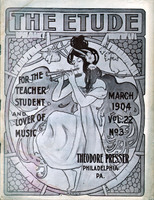One common mistake made with regard to all mechanical devices to secure technical skill is that they are looked upon too much as royal roads the use of which will secure superlative results with the least possible mental effort, whereas they all require great concentration of thought while being employed to make the best of them of any practical use. A certain amount of practice, proportionate, within due limits, to the difficulty of the music to be executed, must be undertaken daily at the keyboard, but the time there can be enormously shortened by knowledge of a few facts and by the application of that knowledge in a scientific manner.
To begin, how few amateur pianists apparently consider whether they have the necessary technical ability to play a piece they wish to learn. They attack the composition with reckless courage, and if it prove beyond their capacity they convert it into a technical exercise, with the result that by the time they can produce some imitation of the composer's intention they have become heartily tired of it, and their neighbors have become—well, say distracted. Now, why is all this practicing necessary? Obviously for two reasons: first, because there is difficulty in reading the notes, and, second, because the fingers are not sufficiently trained to execute the passages. With regard to the notes, they should be studied away from the keyboard. Every bar should be analyzed, the fingering, accentuation, and phrasing carefully noted; in short, after perhaps running through the piece to get a general acquaintance with its character, it should not be taken to the instrument again until its essential peculiarities are thoroughly familiar. If this be done conscientiously it will be found that far less time need be spent in finger work at the keyboard, for there will be no contradictory impulses, each finger will receive distinct orders from the brain, and the right accentuation will be secured by proper use being made of the strongest fingers.
This decision of mental impulse is far more important than is commonly supposed, but it is on the brain rather than on the fingers that executive brilliancy depends. This is supported by the fact that nerve force is, to a large extent, a matter of temperament, and greatly varies in rapidity in different people. The majority of people think that in practicing they are teaching their fingers to play, whereas for the most part they are merely making acquaintance with the music which their fingers could execute at once perfectly if the brain would only clearly direct them. In like manner, as intimacy with the music can be acquired away from an instrument, so the fingers can in great measure be trained to obey the will by analyzing what is required from them.
The differences of touch should be clearly understood; otherwise the variety of action cannot be realized. Power of tone depends upon the rapidity of the blow from the finger, but its quality results from the character of the blow; if the finger be stiffened the quality will be hard and metallic, but if a due amount of elasticity be preserved the tone will be richer in volume. Brilliant passages require the fingers to hit down on the keys from a distance, but to make a melody sing, the fingers generally touch the surface of the keys before the note is due, and the key is depressed in a manner suggestive of pressure, the whole hand being kept in its most elastic condition. The fingers varying in length, it follows that, unless a special effort be made, each finger naturally produces a slightly different quality of tone. Hence the importance of right fingering, especially in music of sympathetic character. In staccato playing the lift of the finger is as important as the fall. If it rise sharply the damper acts with full force; if less sharply the tone will be more rounded off. Other effects are produced by the position and action of the wrist and occasionally the forearm.
It is command of these movements and a clear comprehension of their effects that constitute the most important part of technique; mere rapidity of scale and arpeggio playing are of less consequence, for by the former the pianoforte can be made to speak significantly, but by the latter only to chatter.—The Referee.



